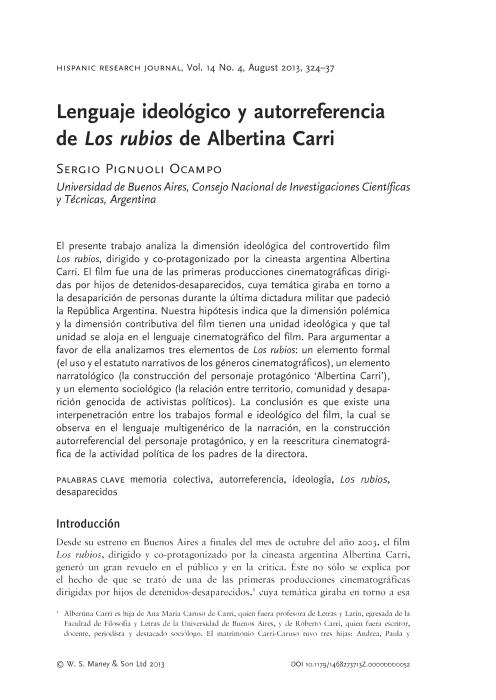Artículo
El presente trabajo analiza la dimensión ideológica del controvertido film Los rubios, dirigido y co-protagonizado por la cineasta argentina Albertina Carri. El film fue una de las primeras producciones cinematográficas dirigidas por hijos de detenidos-desaparecidos, cuya temática giraba en torno a la desaparición de personas durante la última dictadura militar que padeció la República Argentina. Nuestra hipótesis indica que la dimensión polémica y la dimensión contributiva del film tienen una unidad ideológica y que tal unidad se aloja en el lenguaje cinematográfico del film. Para argumentar a favor de ella analizamos tres elementos de Los rubios, un elemento formal (el uso y el estatuto narrativos de los géneros cinematográficos), un elemento narratológico (la construcción del personaje protagónico ´Albertina Carri´) y un elemento sociológico (la relación entre territorio, comunidad y desaparición genocida de activistas políticos). La conclusión es que existe una interpenetración entre los trabajos formal e ideológico del film, la cual se observa en el lenguaje multigenérico de la narración, en la construcción autorreferencial del personaje protagónico, y en la reescritura cinematográfica de la actividad política de los padres de la directora. This paper analyses the ideological dimension of the controversial film Los rubios, directed by and co-starring the Argentinian film-maker Albertina Carri. The movie was one of the first directed by the children of political disappeared parents, whose theme is the disappearance of people during the last military dictatorship that the Argentine Republic suffered. Our hypothesis indicates that both the polemical and the contributory dimension of the film attain an ideological unity, and that that unity resides in the filmic language of Los rubios. To discuss this we analyse three factors: a formal factor (the narrative use and status of filmic genres), a narratological factor (the construction of the main character 'Albertina Carri'), and a sociological factor (the relationship between territory, community, and the genocidal disappearance of political activists). Our conclusion is that there is an interpenetration between the formal and the ideological aspects of the film, which is observed in the multi-generic narrative language, in the self-referential construction of the main character, and in the filmic re-writing of the political activity of the director's parents
Lenguaje ideológico y autorreferencia de Los rubios de Albertina Carri
Título:
Ideological language and self-reference in Los rubios by Albertina Carri
Fecha de publicación:
08/2013
Editorial:
Taylor & Francis
Revista:
Hispanic Research Journal
ISSN:
1468-2737
Idioma:
Español
Tipo de recurso:
Artículo publicado
Clasificación temática:
Resumen
Palabras clave:
Autorreferencia
,
Ideología
,
Luhmann
,
Giro performativo
Archivos asociados
Licencia
Identificadores
Colecciones
Articulos(SEDE CENTRAL)
Articulos de SEDE CENTRAL
Articulos de SEDE CENTRAL
Citación
Pignuoli Ocampo, Sergio; Lenguaje ideológico y autorreferencia de Los rubios de Albertina Carri; Taylor & Francis; Hispanic Research Journal; 14; 4; 8-2013; 324-337
Compartir
Altmétricas




